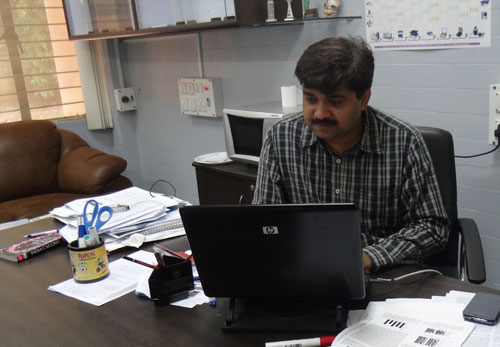Group Leader

Dr. Amit Singh
Associate professor
PhD (University of Delhi, South Campus)
Centre for Infectious Disease Research
Indian Institute of Science
CV Raman Avenue
Bangalore-560012, India
Phone: +91 8022933063, +91 8022933273, +91 8022933275
E.mail:asingh@iisc.ac.in
Dr. Amit Singh joined Department of Microbiology and Cell Biology (MCBL), Indian Institute of Science, as an Assistant professor in 2014, after serving at ICGEB, New Delhi, as a Wellcome-DBT Intermediate Fellow (May 2010-Jan 2014). Dr. Singh received his Bachelor’s degree in Science from University of Delhi in Microbiology and Master’s degree in Biotechnology from IIT Roorkee in 1998. He joined Prof. Anil Tyagi’s Lab, Department of Biochemistry, University of Delhi, South Campus in 1999 and was awarded Ph.D in 2004. During his Ph.D, he worked on deciphering the role of genes involved in Mycobacterium tuberculosis (Mtb) pathogenesis.
He obtained his Post doctoral training at University of Alabama Birmingham (UAB), USA, where he worked in the area of redox signalling and latency mechanisms in Mtb. In 2010, he returned back to India and joined ICGEB, New Delhi. In ICGEB, he expanded on his expertise in redox biology of human pathogens to dissect the role of redox sensitive transcription factors in Mtb pathogenesis. Importantly, his group focused on WhiB family of proteins and characterized their roles mycobacterial survival and persistence. Furthermore, his group has developed a novel GFP-based biosensor to precisely measure the redox physiology of Mtb during infection. The biosensor allows researchers to quantify the capacity of TB bacteria to survive antibiotics through a low molecular weight anti-oxidant thiol, mycothiol, and revealed the importance of mycothiol redox potential in drug tolerance and persistence in Mtb. He has creatively adapted the biosensor technology to map the redox physiology of HIV-infected macrophages and lymphocytes and provided a redox basis for HIV-1 latency and reactivation. He continues to unravel the redox mysteries using two important human pathogens i.e. HIV and Mtb.
